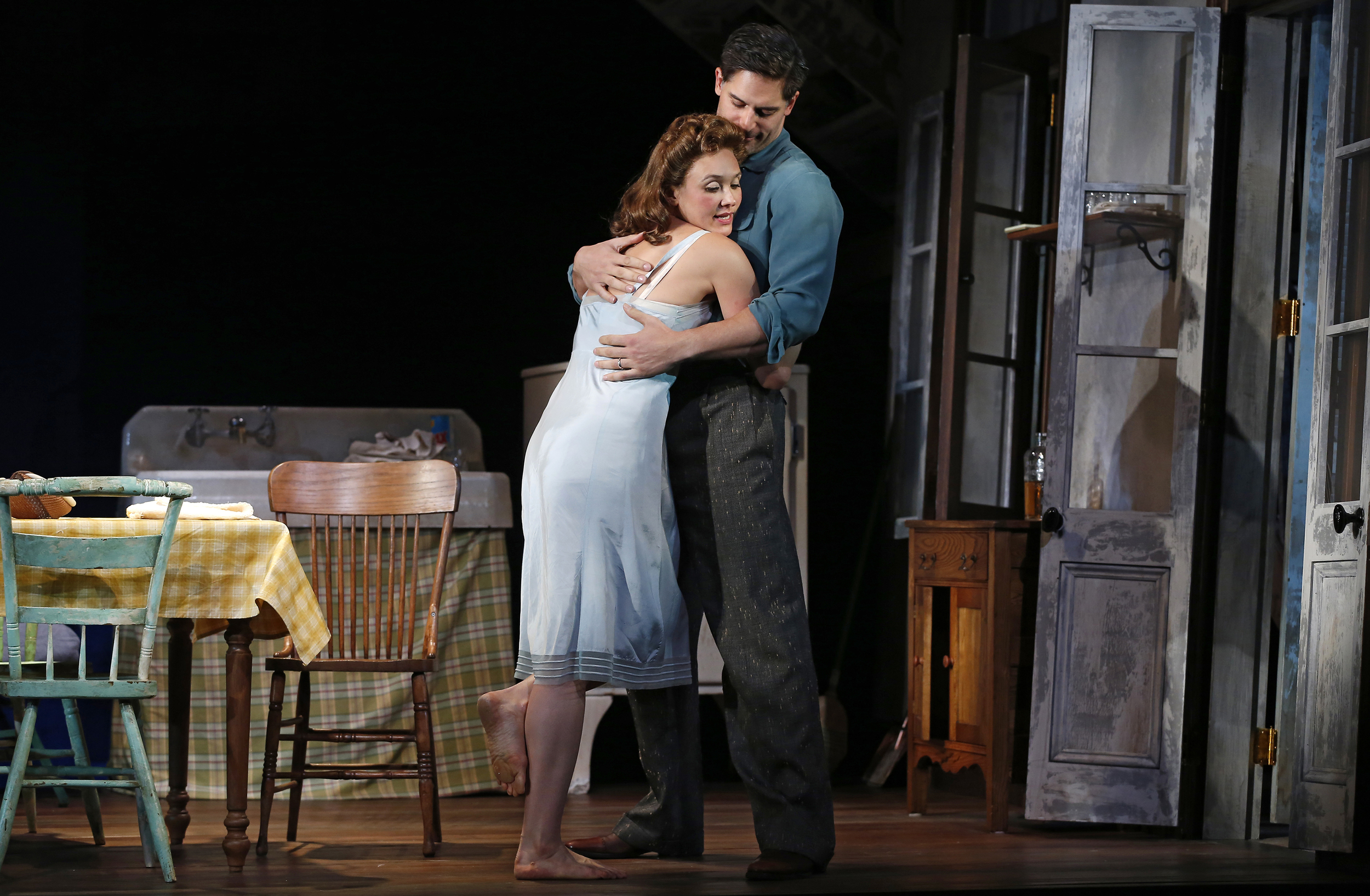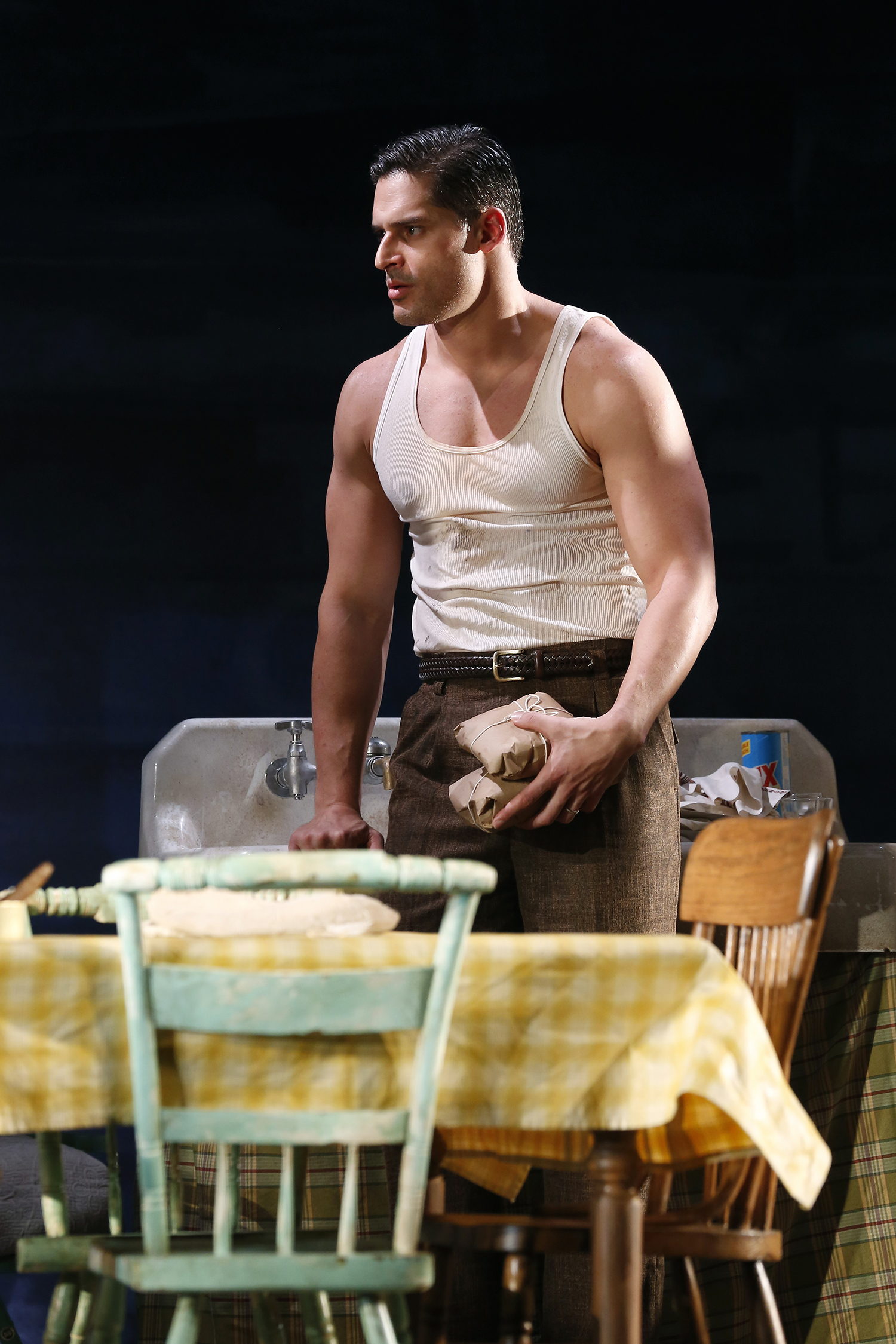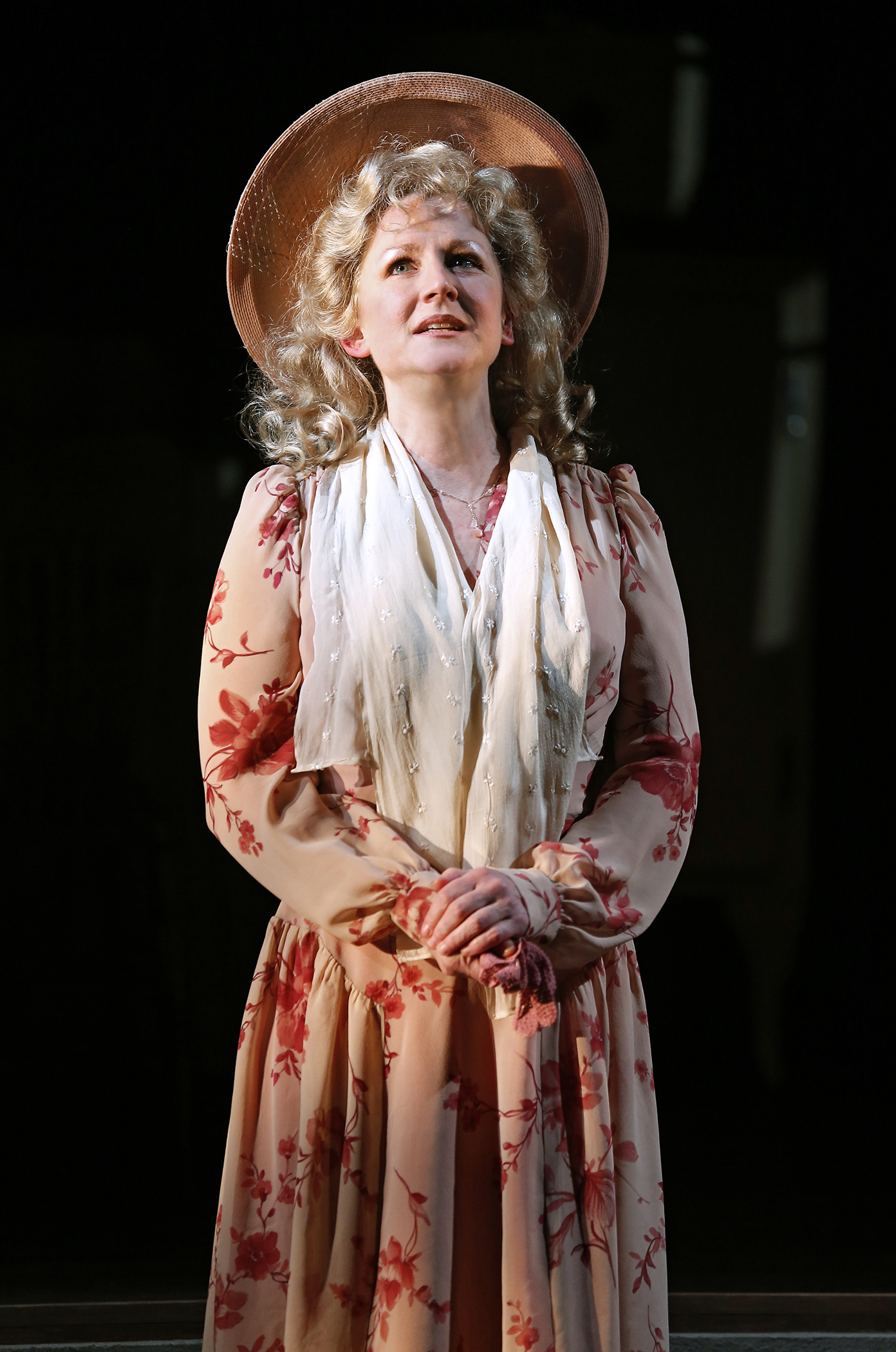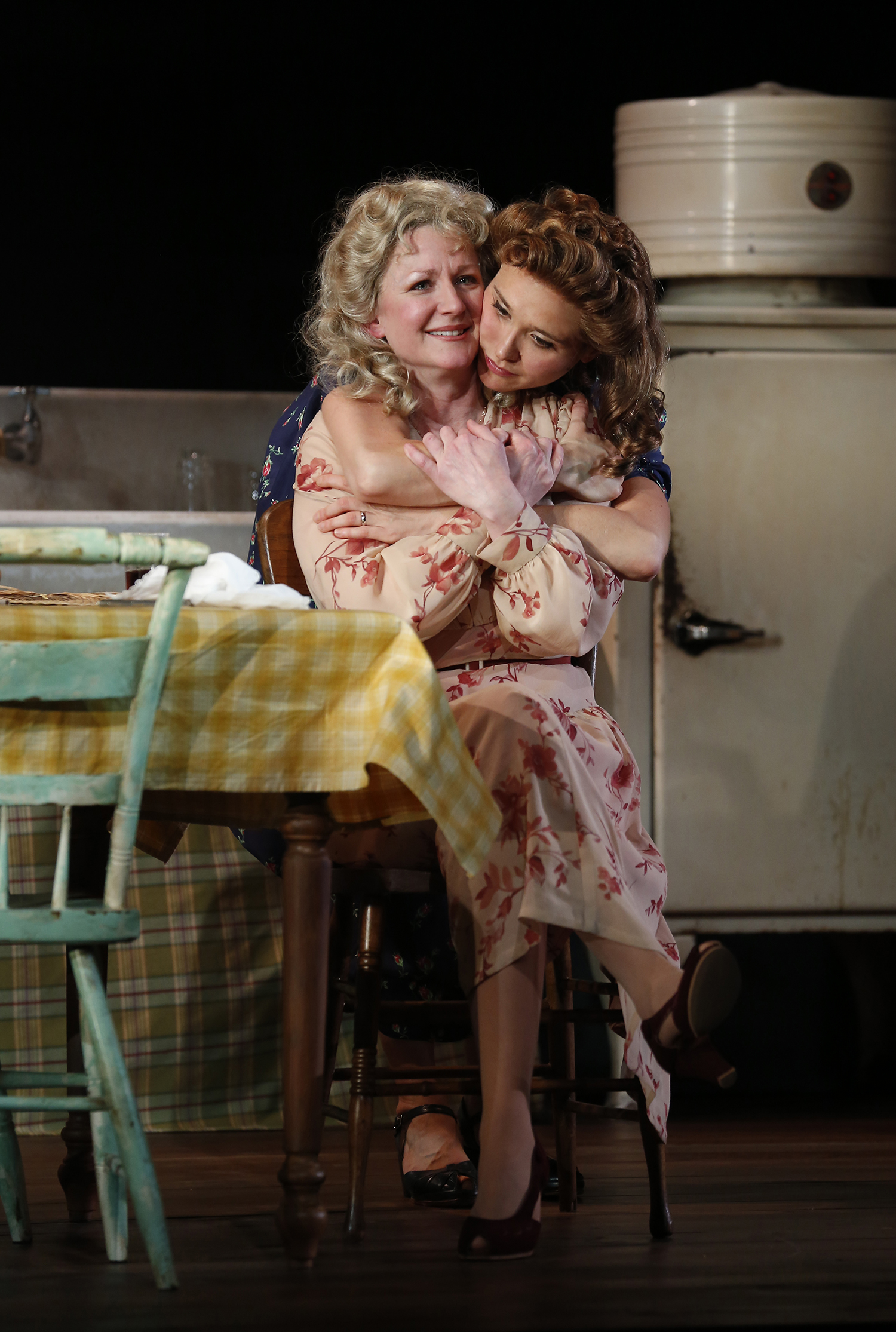Without doubt, Tennessee Williams’ A Streetcar Named Desire is a great play. While some might choose The Glass Menagerie as the quintessential Williams play, I’ve always preferred the goings-on in Elysian Fields, giving us that fascinating threesome plus one of Stanley, Stella, Blanche, and Mitch. The play is so good in giving these characters interesting things to say and do that, we imagine, all a director and cast need do is get out of the way and let the thing work. Directed by Mark Rucker, the Yale Rep’s Streetcar aims for and mostly achieves the kind of definitive version admirers of the play would hope for.
Start with that set (Reid Thompson, Scenic Design): the size of the University Theater stage is put to good effect—particularly its height, with an upstairs we can see just below the overhanging curtain, so that there is a real feel for a two-room apartment below another one. It’s the classic proscenium with missing fourth wall, and it’s satisfying to see it used so well, with very fluid movements from one room to another and from outside to inside. The action is all blocked with an animated naturalism that moves at just the right pace. The play is long—with two intermissions that are required for dramatic curtains along the way—but never tiring. If you already know the play well, it’s still a great opportunity to study Williams’ ability to structure scenes and dialogue. Theater, film, television—rarely are scripts this good.
All the buzz in the media has focused on Joe Manganiello as Stanley. While I can’t claim any knowledge of Manganiello’s work as a werewolf, I feel certain his fans will get what they came for. In his very first scene he strips off his shirt to expose his ultra-buff bod—he’s so built, it’s almost a special effect—and in general he struts his stuff so as to give us a Stanley who is a bit more muscle-bound than might be common. The physical threat of Stanley is therefore palpably present, and so I found myself struck by how reserved this Stanley can be. I mean, he could really cause some damage, but is generally an easy-going guy. To a certain extent, Stanley—as written—received a disservice in the widespread view of Marlon Brando as the definitive performance of the role. Brando’s Stanley is far too fascinating, full of an intensity that goes well beyond the kind of guy Stanley is meant to be. Manganiello’s Stanley, to my mind, is closer to the “average Joe” qualities we should find in the master of 632 Elysian Fields.
In the demerits column, Manganiello’s performance at times left a bit to be desired in terms of elocution—the effort to give Stanley a certain tone and voice is appreciated, but at times the lines get a little swallowed, and there wasn’t quite as much comedy as there might be—as with the Napoleonic Code and the contents of Blanche’s trunk. But then comedy is hard, as they say.
The main emphasis in any production of Streetcar must fall on the role of Blanche. René Augesen takes on this exhausting role with amazing energy and a full sense of its many nuances. There aren’t any surprises in her performance, but there is a great feel for Blanche’s wit, and for the comic aspects of the play. Even knowing the outcome, we can watch the play with a sense that nothing that happens is a foregone conclusion. Even when the revelations about her past begin to surface, Blanche has the presence of mind to face them with style. Sure, she’s on a downward spiral after her last scene with Mitch, but it’s still the assault from Stanley that tips her over the edge. What I enjoyed most in Augesen’s performance is a sense of just how resilient and adaptable Blanche is. It’s a role full of the tragedy of indignity and Augesen gets it all across. And her costumes (Hunter Kaczorowski) are amazing—particularly the robe of Della Robbia blue in which she departs her sister’s home.
There’s fine support all along the way: April Matthis and Marc Damon Johnson, as Eunice and Steve Hubbell, the upstairs neighbors, have a proprietary sense of belonging that underscores the uniqueness of the DuBois sisters, and Adam O’Byrne’s Mitch meets the challenge of playing awkwardness gracefully. As the most “sensitive” of Stanley’s friends, Mitch might be just what Blanche needs—and Streetcar is perhaps at its best in showing that illusion can only go so far in masking the hard line of reality. The interplay of illusion and realism—as dramaturg Helen Jaksch’s playbill points out—is crucial to Williams’ sense of theater, and to see fond illusions crumple is both sad, inevitable, and dramatically satisfying, even if that means deliberate cruelty is the victor.
In the end, the female roles are what make this production—particularly the many nice comic touches in the sisterly rapport between Blanche and Sarah Sokolovic’s Stella. Sokolovic plays Stella as a realist who accepts the world she lives in without expecting more from it than it can provide; she’s a constant contrast to Blanche’s genteel volubility and fanciful conceptions, and Sokolovic lets her facial expressions in silent reactions say a lot. We have the sense of a woman who has been found wanting in Blanche’s view of things all their lives, and her solicitude for her sister is matched by her sense of Blanche’s pretensions. Some of the best scenes are the ones when the sisters are alone together.
One cavil: the moment when Stella, after her make-up session with Stanley, climbs out of bed nude in her sister’s presence. Nudity on stage is fine, but when it’s not specified in the text, we can wonder what purpose it serves. While it might be in character for Stella to be nude in front of her sister—which I doubt, given her sense of Blanche’s dignity—it seems to me completely out of character for Blanche not to say something. But she can’t say anything because Williams didn’t intend for her to be reacting to nudity.
It’s the one ill-chosen contemporary touch in this otherwise faithful, entertaining, and fascinating revival.
A Streetcar Named Desire By Tennessee Williams Directed by Mark Rucker
Scenic Designer: Reid Thompson; Costume Designer: Hunter Kaczorowski; Lighting Designer: Stephen Strawbridge; Composer and Sound Designer: Steven Brush; Production Dramaturg: Helen C. Jaksch; Dialect Coach: Jane Guyer Fujita; Fight Director: Rick Sordelet; Casting Director: Tara Rubin; Stage Manager: James Mountcastle; Photographs: Carol Rosegg, courtesy of Yale Repertory Theatre
Yale Repertory Theatre September 20-October 12, 2013








